The introduction of artificial intelligence (AI) in the medical imaging industry is revolutionizing the world with advanced diagnosis and treatment processes. The use of deep learning for image recognition, feature extraction, and pattern recognition enhances the accuracy and efficiency of image diagnosis. In addition, AI provides advanced capabilities for monitoring the effects of treatments, predicting disease progression, and managing patient conditions, thereby offering more powerful solutions to doctors.
AI can further enhance real-time processing and multimodal fusion, thereby increasing its usefulness in medical imaging. Multimodal fusion techniques yield highly rich information about diseases by integrating several types of images, while real-time analysis enhances precision during surgery. AI enhances treatment effectiveness by improving regimen compliance and enhancing the patient experience through tailored programs. The potential of medical imaging powered by AI technologies offers remarkable benefits toward improving diagnostic accuracy alongside therapeutic efficiency, ultimately leading to superior healthcare.
AI In Medical Image Analysis: A Basic Overview
AI plays a critical role in healthcare, particularly in enhancing diagnostic accuracy. A key aspect of AI healthcare solutions is that they are increasingly focused on predicting diseases early. According to the global experts from BCG and BCG X, the implementation of AI in healthcare, including medical imaging technology, is transforming everything from diagnosis to therapy to disease management. The early detection of diseases by AI is not a trend merely for the health system, but a necessity for modern health systems to improve patient care and decrease the inefficiency that exists during patients’ episodes of care.
Medical image analysis, using conventional methods, has undergone significant development. During the early days, these procedures were performed by radiologists and clinicians who interpreted X-rays, CT, or MRI images by eye, frequently resulting in diagnostic difficulties, delays, and errors. After the emergence of AI, this field has witnessed a transition to ML and DL applications. Such innovations have overcome several challenges faced by human analysts, resulting in more accurate and timely outcomes, which are imperative for early disease diagnosis.
What Is AI In Healthcare?
In the world of AI in healthcare, the goal is to imitate and enhance human capabilities through computer technology systems. Artificial intelligence, in general, utilizes models and algorithms that learn from historical data to identify specific trends within that dataset and subsequently make forecasts based on those predictions. Some of the most crucial components of AI relevant to the innovation in healthcare are:
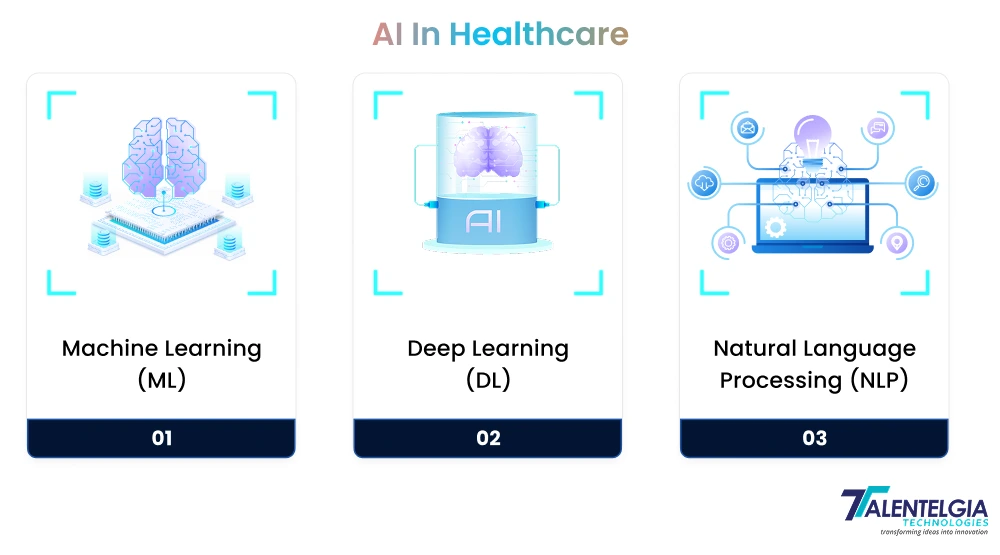
- Machine Learning (ML): uses sophisticated mathematical models to analyze data without being pre-programmed, useful in detecting complex or hidden trends
- Deep Learning (DL): uses multi-layered neural networks to process vast amounts of data, including medical imaging analysis and detection of nuanced features in scans.
- Natural Language Processing (NLP): Gives machines the ability to understand and produce human language, facilitating tasks such as scanning health records and analyzing clinical notes.
On September 9, 2024, Dr. Andrew Auerbach from UFSC shared his insights on the JAMA Network and highlighted that researchers will soon conduct a high volume of studies on using AI to detect and solve aggravating diagnostic errors, aiming to improve their performance.
Why Is AI Medical Imaging & Diagnostics Important?
In the healthcare sector, missing, delaying, or misdiagnosing a problem often leads to costly or even tragic mistakes. In some cases, the damage caused is irreparable. A report issued by the US Government Accounting Office claims that over 12 million Americans have fallen victim to such errors every single year, with costs amounting to well above $100 billion.
There is no doubt that the financial stake and the psychosocial impact are high. Correct and prompt diagnoses often determine how and when treatment will take place. They also affect public health initiatives and influence healthcare spending. Although medical science has advanced significantly over the decades, AI-powered diagnostic tools now play an indispensable role. These tools can process large volumes of patient data far more efficiently than human physicians, thanks to their advanced algorithms.
The AI medical imaging and diagnostics present opportunities that offer significant benefits, such as meticulous examination of large datasets for hinting at patterns and anomalies that human stakeholders are likely to overlook. Apart from imaging, electronic health records, and many other streams, decision support is receiving augmentation through new AI integrations with advanced data processing techniques:
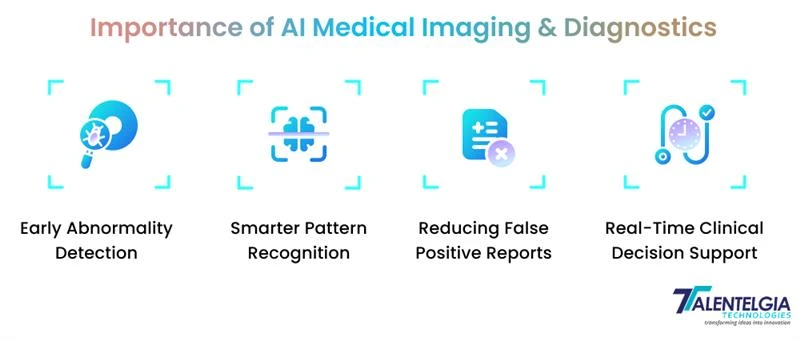
1. Early Abnormality Detection
The ability of AI systems to identify changes in tissue related to neoplastic processes in MRIs or CT scans is unparalleled, offering an edge that surpasses human capabilities. This type of automation leads towards intervention much earlier than what traditional workflows allow. This not only improves outcomes but also drives a reduction in clinical errors by preventing medical errors, including those that lead to late disease diagnosis.
2. Smarter Pattern Recognition
By analyzing patient data, machine learning models can detect intricate relationships between variables. For example, they could identify a higher risk of stroke in cases of patients coming with dizziness, or identify risk factors of sepsis in hospitalized patients, often more rapidly than the manual approaches.
3. Reducing False Positive Reports
Deep learning applied to medical imaging can assist radiologists and pathologists in verifying findings, thereby reducing the likelihood that patients will require unnecessary biopsies or follow-up tests. This is not only a cost reduction but also helps decrease patients’ anxiety.
4. Real-Time Clinical Decision Support
Machine learning in medicine can analyze clinical notes, patient histories, and even research papers thoroughly to provide doctors with the necessary information to help them make the right call in real time, providing assistance that supplements the collective wisdom of human experts.
Case Studies & Real World Examples of AI Medical Imaging
The application of AI within medical imaging is being experienced in numerous fields and specialties. With the help of AI diagnostics, diagnostics for both breast cancer and lung disease are more efficient and accurate than ever, featuring high-definition images and automated assessments.
1. AI in Nuclear Cardiac Imaging
Cardiology AI is already demonstrably making a difference and can be seen in action in nuclear cardiology, where it detects minor perfusion abnormalities, increasing the accuracy of coronary artery disease diagnosis by 14% (Forbes Tech Council, 2025). Integrating cardiovascular diagnostics with AI-powered imaging enables clinicians to detect early disease and plan targeted treatment more effectively. Centella offers cardiology ultrasound imaging solutions for improved ultrasound diagnosis in cardiac care.
2. Breast Cancer Screening
AI-powered systems are changing the game for breast cancer detection and minimizing false positives. By reviewing mammograms with machine learning algorithms, AI enhances radiologists’ ability to detect tumours early. ACRDSI’s AI Central says there are now 30 FDA-approved breast imaging AI algorithms. These artificial intelligence (AI)-enabled tools help analyse dense breast tissue, detect subtle abnormalities, and add an extra layer of confidence to help the physician’s decision-making process.
3. Lung Disease Detection
AI is also transforming pulmonary diagnostics, enhancing the diagnosis and classification of lung diseases, including chronic obstructive pulmonary disease (COPD). Recent studies have shown that AI-based methods are being applied to analyze auscultation data, pulmonary function tests, and imaging for the identification of COPD phenotypes. A study conducted in Turkey utilised deep learning to analyse 12-channel lung sounds from 41 participants at various stages of COPD, achieving a classification accuracy of over 94% and an AUC of 0.9659.
The Future of AI In the Medical Field
AI-based medical image analysis has already revolutionized healthcare, offering a powerful tool for early disease detection and enhancing patient care. Given the progress of these technologies to date, the possibility of more accurate, efficient, and accessible diagnosis would increase. For healthcare executives, however, the future is about embracing these new AI development solutions, investing in AI-driven solutions like +, and participating in partnerships that continue to advance medical imaging.
The future of health will not only be about treating illness — it will be about predicting and preventing it more precisely than ever.


 Healthcare App Development Services
Healthcare App Development Services
 Real Estate Web Development Services
Real Estate Web Development Services
 E-Commerce App Development Services
E-Commerce App Development Services E-Commerce Web Development Services
E-Commerce Web Development Services Blockchain E-commerce Development Company
Blockchain E-commerce Development Company
 Fintech App Development Services
Fintech App Development Services Fintech Web Development
Fintech Web Development Blockchain Fintech Development Company
Blockchain Fintech Development Company
 E-Learning App Development Services
E-Learning App Development Services
 Restaurant App Development Company
Restaurant App Development Company
 Mobile Game Development Company
Mobile Game Development Company
 Travel App Development Company
Travel App Development Company
 Automotive Web Design
Automotive Web Design
 AI Traffic Management System
AI Traffic Management System
 AI Inventory Management Software
AI Inventory Management Software
 AI Software Development
AI Software Development  AI Development Company
AI Development Company  AI App Development Services
AI App Development Services  ChatGPT integration services
ChatGPT integration services  AI Integration Services
AI Integration Services  Generative AI Development Services
Generative AI Development Services  Natural Language Processing Company
Natural Language Processing Company Machine Learning Development
Machine Learning Development  Machine learning consulting services
Machine learning consulting services  Blockchain Development
Blockchain Development  Blockchain Software Development
Blockchain Software Development  Smart Contract Development Company
Smart Contract Development Company  NFT Marketplace Development Services
NFT Marketplace Development Services  Asset Tokenization Company
Asset Tokenization Company DeFi Wallet Development Company
DeFi Wallet Development Company Mobile App Development
Mobile App Development  IOS App Development
IOS App Development  Android App Development
Android App Development  Cross-Platform App Development
Cross-Platform App Development  Augmented Reality (AR) App Development
Augmented Reality (AR) App Development  Virtual Reality (VR) App Development
Virtual Reality (VR) App Development  Web App Development
Web App Development  SaaS App Development
SaaS App Development Flutter
Flutter  React Native
React Native  Swift (IOS)
Swift (IOS)  Kotlin (Android)
Kotlin (Android)  Mean Stack Development
Mean Stack Development  AngularJS Development
AngularJS Development  MongoDB Development
MongoDB Development  Nodejs Development
Nodejs Development  Database Development
Database Development Ruby on Rails Development
Ruby on Rails Development Expressjs Development
Expressjs Development  Full Stack Development
Full Stack Development  Web Development Services
Web Development Services  Laravel Development
Laravel Development  LAMP Development
LAMP Development  Custom PHP Development
Custom PHP Development  .Net Development
.Net Development  User Experience Design Services
User Experience Design Services  User Interface Design Services
User Interface Design Services  Automated Testing
Automated Testing  Manual Testing
Manual Testing  Digital Marketing Services
Digital Marketing Services 
 Ride-Sharing And Taxi Services
Ride-Sharing And Taxi Services Food Delivery Services
Food Delivery Services Grocery Delivery Services
Grocery Delivery Services Transportation And Logistics
Transportation And Logistics Car Wash App
Car Wash App Home Services App
Home Services App ERP Development Services
ERP Development Services CMS Development Services
CMS Development Services LMS Development
LMS Development CRM Development
CRM Development DevOps Development Services
DevOps Development Services AI Business Solutions
AI Business Solutions AI Cloud Solutions
AI Cloud Solutions AI Chatbot Development
AI Chatbot Development API Development
API Development Blockchain Product Development
Blockchain Product Development Cryptocurrency Wallet Development
Cryptocurrency Wallet Development About Talentelgia
About Talentelgia  Our Team
Our Team  Our Culture
Our Culture 
 Healthcare App Development Services
Healthcare App Development Services Real Estate Web Development Services
Real Estate Web Development Services E-Commerce App Development Services
E-Commerce App Development Services E-Commerce Web Development Services
E-Commerce Web Development Services Blockchain E-commerce
Development Company
Blockchain E-commerce
Development Company Fintech App Development Services
Fintech App Development Services Finance Web Development
Finance Web Development Blockchain Fintech
Development Company
Blockchain Fintech
Development Company E-Learning App Development Services
E-Learning App Development Services Restaurant App Development Company
Restaurant App Development Company Mobile Game Development Company
Mobile Game Development Company Travel App Development Company
Travel App Development Company Automotive Web Design
Automotive Web Design AI Traffic Management System
AI Traffic Management System AI Inventory Management Software
AI Inventory Management Software AI Software Development
AI Software Development AI Development Company
AI Development Company ChatGPT integration services
ChatGPT integration services AI Integration Services
AI Integration Services Machine Learning Development
Machine Learning Development Machine learning consulting services
Machine learning consulting services Blockchain Development
Blockchain Development Blockchain Software Development
Blockchain Software Development Smart contract development company
Smart contract development company NFT marketplace development services
NFT marketplace development services IOS App Development
IOS App Development Android App Development
Android App Development Cross-Platform App Development
Cross-Platform App Development Augmented Reality (AR) App
Development
Augmented Reality (AR) App
Development Virtual Reality (VR) App Development
Virtual Reality (VR) App Development Web App Development
Web App Development Flutter
Flutter React
Native
React
Native Swift
(IOS)
Swift
(IOS) Kotlin (Android)
Kotlin (Android) MEAN Stack Development
MEAN Stack Development AngularJS Development
AngularJS Development MongoDB Development
MongoDB Development Nodejs Development
Nodejs Development Database development services
Database development services Ruby on Rails Development services
Ruby on Rails Development services Expressjs Development
Expressjs Development Full Stack Development
Full Stack Development Web Development Services
Web Development Services Laravel Development
Laravel Development LAMP
Development
LAMP
Development Custom PHP Development
Custom PHP Development User Experience Design Services
User Experience Design Services User Interface Design Services
User Interface Design Services Automated Testing
Automated Testing Manual
Testing
Manual
Testing About Talentelgia
About Talentelgia Our Team
Our Team Our Culture
Our Culture
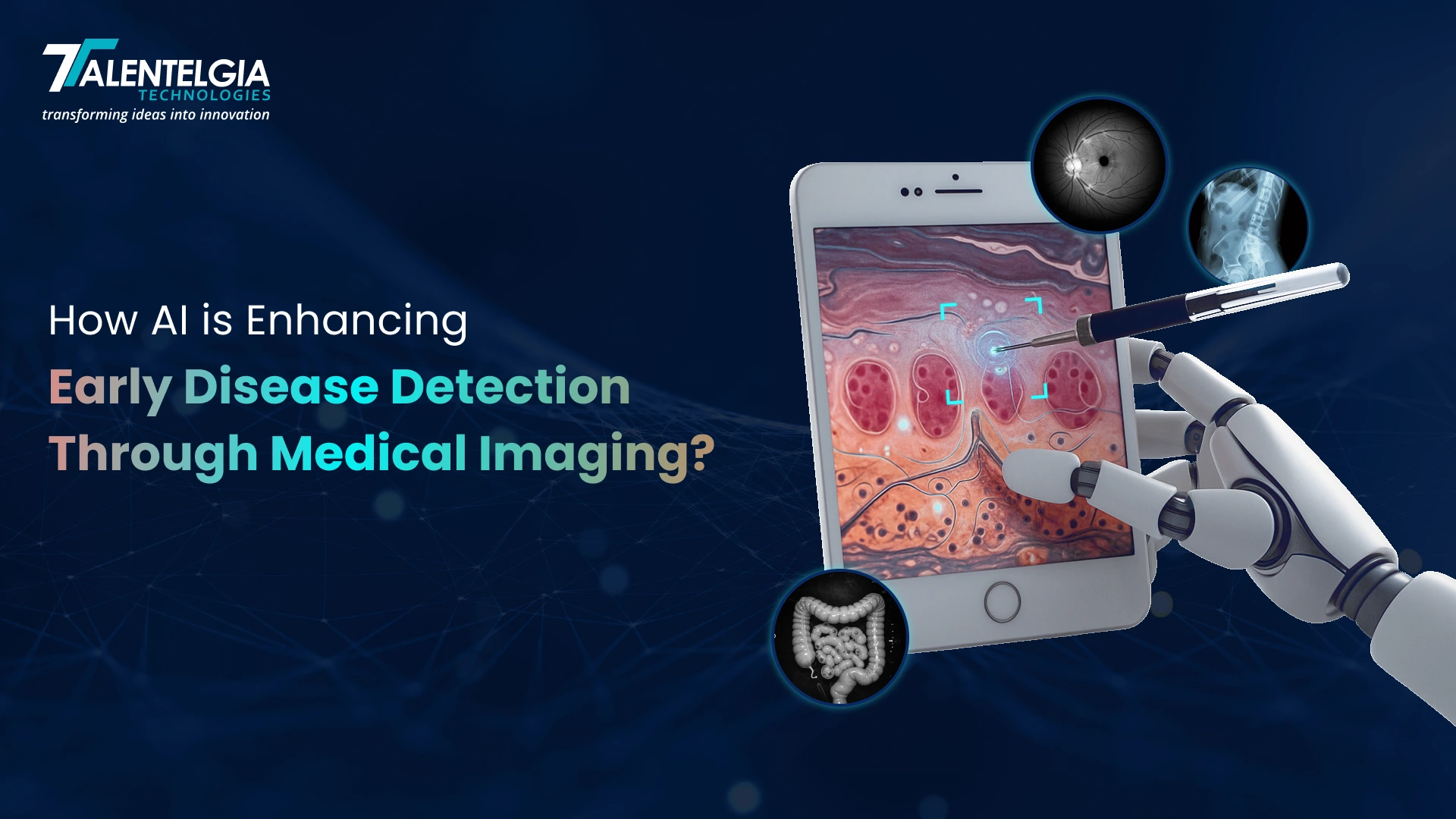
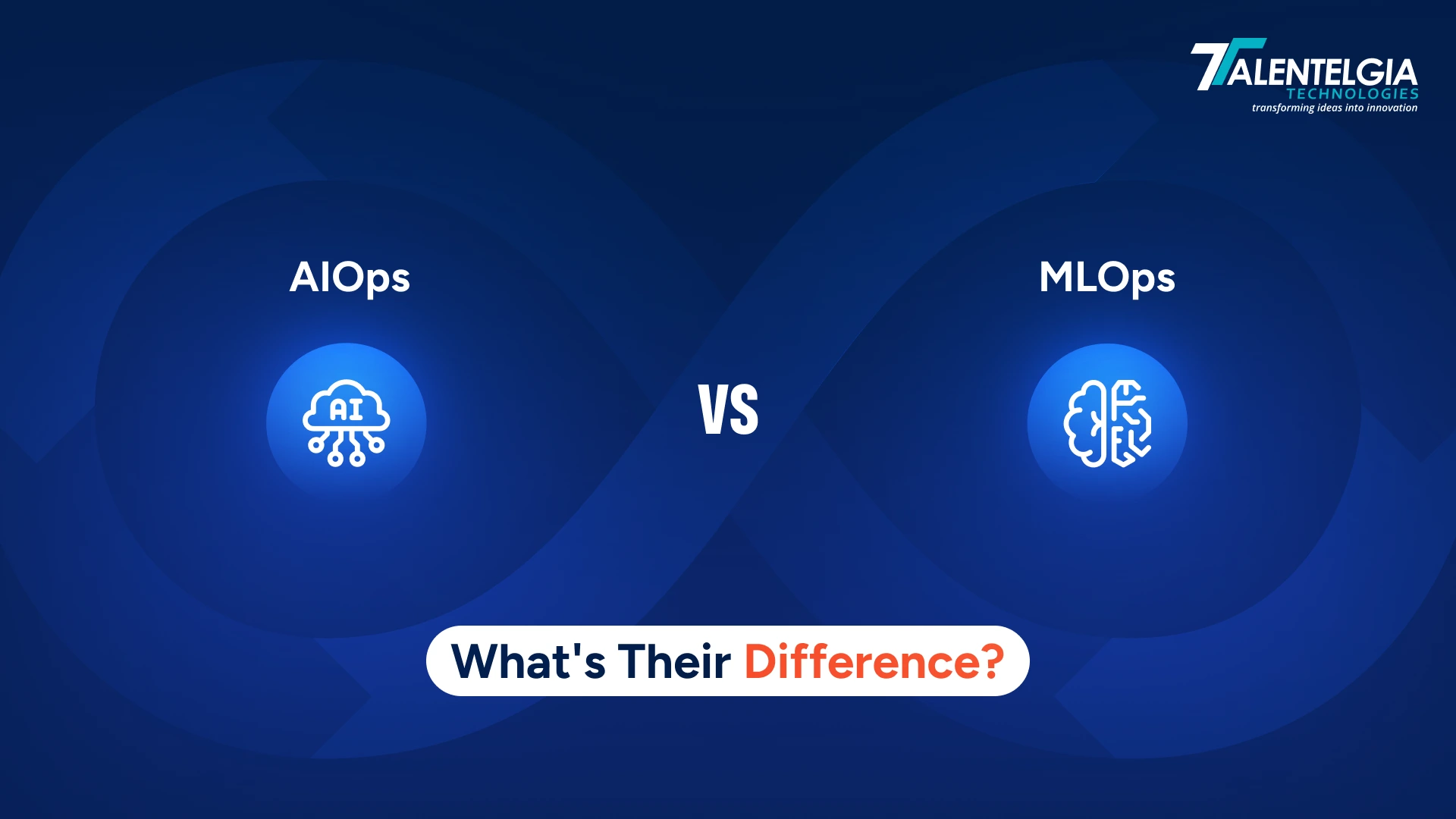

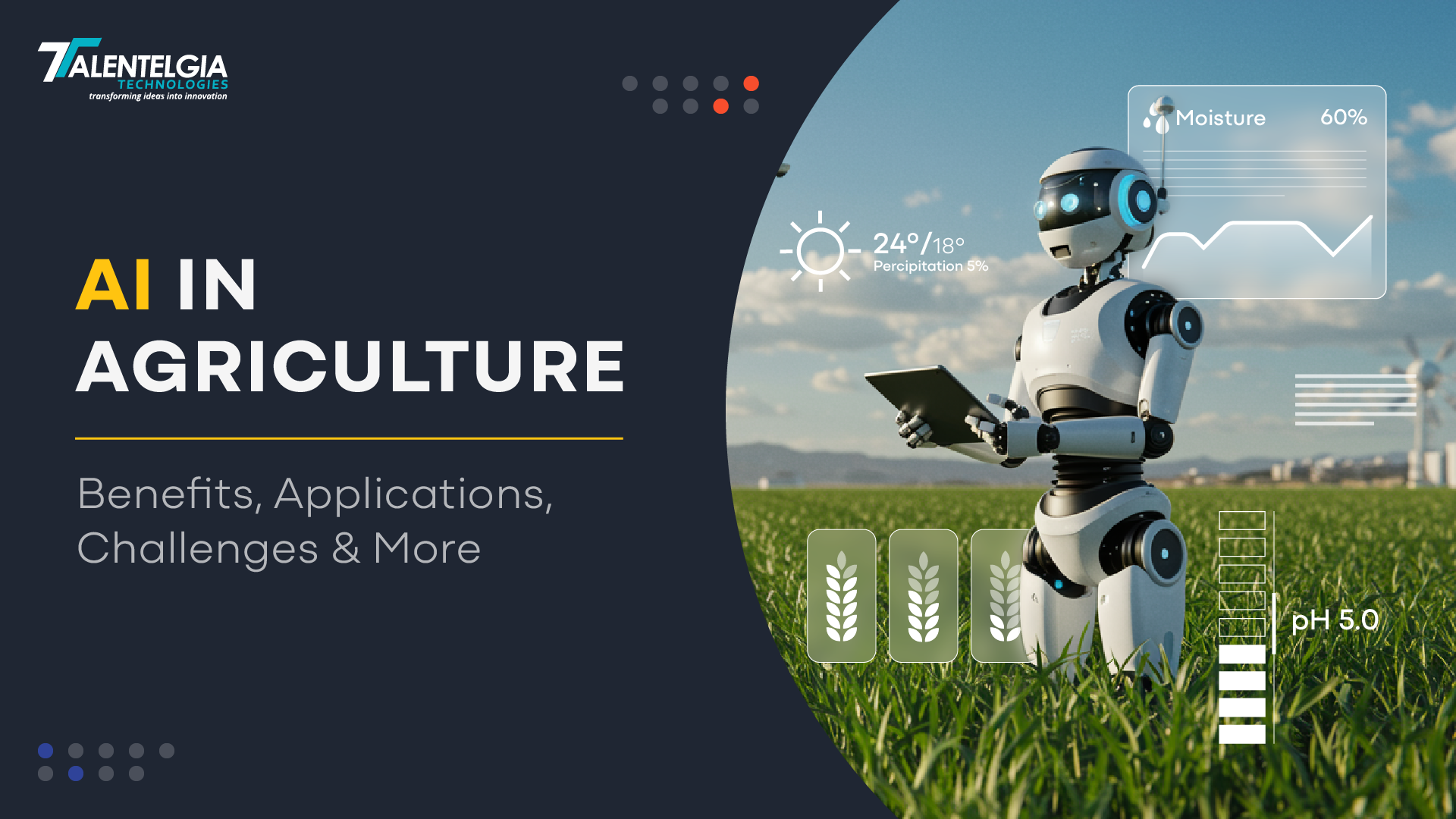













 Write us on:
Write us on:  Business queries:
Business queries:  HR:
HR: 




